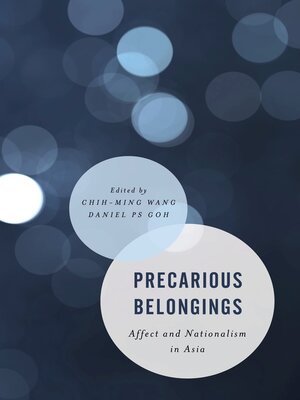Precarious Belongings
ebook ∣ Affect and Nationalism in Asia · Asian Cultural Studies: Transnational and Dialogic Approaches
By Chih-ming Wang

Sign up to save your library
With an OverDrive account, you can save your favorite libraries for at-a-glance information about availability. Find out more about OverDrive accounts.
Find this title in Libby, the library reading app by OverDrive.



Search for a digital library with this title
Title found at these libraries:
| Library Name | Distance |
|---|---|
| Loading... |
In the midst of refugee crises, terrorist attacks and territorial disputes across the globe, nationalism remains a powerful force in generating affects of inclusion and exclusion. In Asia, inter-Asian migration, enabled and disrupted by a history of colonialism, capitalist globalization and political conflicts, has rendered the idea of nation as both politically distinct and culturally malleable.
Precarious Belongings: Affect and Nationalism in Asia explores the affective politics of Asian nationalism by addressing the entwined structures of precarious belonging and national feelings. Bringing together leading scholars it looks at how the reification of nationalism in social movements, popular sentiments, online groups, and cultural representation directs hatred towards migrant and minority groups across Asia. The book posits that nationalist affects are embedded in the politics of exclusion, and seeks to make room for precarious belongings in the transnational and multicultural present. It should be of interest to students and scholars interested in Asian Cultural Studies, transnationalism, migration and nationalism.
Precarious Belongings: Affect and Nationalism in Asia explores the affective politics of Asian nationalism by addressing the entwined structures of precarious belonging and national feelings. Bringing together leading scholars it looks at how the reification of nationalism in social movements, popular sentiments, online groups, and cultural representation directs hatred towards migrant and minority groups across Asia. The book posits that nationalist affects are embedded in the politics of exclusion, and seeks to make room for precarious belongings in the transnational and multicultural present. It should be of interest to students and scholars interested in Asian Cultural Studies, transnationalism, migration and nationalism.







